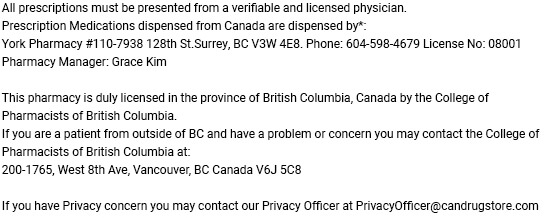Description
Indications
Desmopressin is a medication utilized to regulate the volume of urine produced by the kidneys. The secretion of urine is under the control of vasopressin, a specific substance present in the body. In individuals suffering from conditions such as diabetes insipidus, head injuries or brain surgery, vasopressin levels are deficient. In such cases, desmopressin, an artificial analog of vasopressin, is administered to compensate for the depleted levels.
This medication aids in managing excessive thirst and urination caused by these conditions, as well as preventing dehydration. Desmopressin is employed to regulate nocturnal enuresis in children by reducing urine frequency and minimizing bedwetting incidents.
Uses and Dosage
To manage diabetes insipidus, take this medication orally, typically two to three times per day- or as per your physician’s instructions.
For bedwetting management, take this medication orally once daily before bedtime. Children should restrict fluid intake after dinner, specifically 1 hour before taking desmopressin until the following morning or at least 8 hours after the dose. In case your child wakes up during the night, control their liquid consumption.
Limit fluid intake, particularly for children and older individuals, when taking desmopressin. If you realize that you are consuming more fluids than prescribed, inform your doctor immediately to adjust your treatment plan.
Dosage is determined based on your medical condition and the response to treatment. Do not exceed the prescribed dosage or take it more frequently than advised.
To achieve maximum benefit, take this medication consistently at the same time(s) each day. Remember to take it regularly.
Notify your doctor if your symptoms persist or if this medication stops functioning correctly.
Side Effects
Some side effects may occur that usually do not need medical attention:
- heartburn
- weakness
- difficulty falling asleep or staying asleep
- warm feeling
- nosebleed
- nostril pain, discomfort, or congestion
- itchy or light-sensitive eyes
- back pain
- sore throat, cough, chills, or other signs of infection
- flushing
Inform your healthcare provider immediately if you experience any serious side effects:
- vomiting
- chest pain
- fast or pounding heartbeat
- rash
- hives
- itching
- difficulty breathing or swallowing
Caution
Prior to taking desmopressin, inform your pharmacist or doctor if you have any allergies to it or other substances. This medication may contain inactive components that can trigger an allergic reaction or other adverse effects.
Before administering this medication, notify your doctor or pharmacist about your medical history, primarily if you have kidney disease, high blood pressure, heart issues, medical conditions that increase the risk of fluid or mineral imbalance (such as cystic fibrosis), an urge to drink excessive water without being thirsty, low levels of sodium in the blood (hyponatremia), or bleeding or clotting disorders.
Restrict alcohol intake since it may interfere with the effectiveness of desmopressin.
Notify your doctor immediately if you encounter any health conditions that may cause fluid or mineral imbalances (including fever, diarrhea, vomiting, or infections such as the flu), or if you experience circumstances that require higher fluid intake (such as exposure to extremely hot weather, intense exercise, or heavy sweating). The physician may need to alter or discontinue desmopressin therapy, primarily in children and older adults.
Children may be more vulnerable to the side effects of this medication, particularly water or mineral imbalances and low sodium levels in the blood.
Older adults may face a higher risk of experiencing water or mineral imbalances and low sodium levels in the blood when using this medication.
During pregnancy, use this medication only when required. Consult your doctor to assess the potential risks and advantages.
This medication passes into breast milk. Consult your doctor before breastfeeding.
Form and Strength
DDAVP is available in the following forms and strengths:
-
DDAVP tablet:
- 0.1mg
- 0.2mg
-
desmopressin tablet:
- 0.1mg
- 0.2mg
FAQ
What does DDAVP do to urine?
It works on the kidneys to decrease the amount of urine made.
What happens if you drink water after taking DDAVP?
Drinking too much water may lead to a serious, life-threatening electrolyte imbalance. Fluid restriction is especially important in children and older adults using desmopressin.
Resources
- https://www.childrensmn.org/educationmaterials/childrensmn/article/15667/desmopressin-ddavp-for-bedwetting/#:~:text=Desmopressin%20(DDAVP)%20is%20a%20synthetic,other%20methods%20to%20prevent%20bedwetting
- https://chicagocolorectal.com/patient-education/healthwise/?DOCHWID=d00583a1#:~:text=exactly%20as%20directed.-,Limit%20your%20intake%20of%20water%20and%20other%20fluids%20while%20you,and%20older%20adults%20using%20desmopressin
- https://www.mayoclinic.org/drugs-supplements/desmopressin-oral-route/side-effects/drg-20088478
- https://my.clevelandclinic.org/health/drugs/19345-desmopressin-tablets
- https://www.webmd.com/drugs/2/drug-12145/ddavp-oral/details
- https://www.drugs.com/mtm/desmopressin.html


 Prescription Required
Prescription Required  Formulation :
Formulation : 





